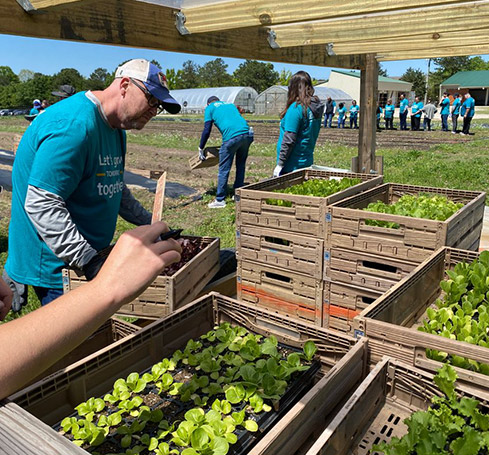The Science Behind Mental Health and Connection
What if volunteering could improve your mental health? And, in turn, your physical and social health as well? Researchers have found that our mental health affects our cancer risk and how healthy our heart, gut, and lungs are. Unmanaged stress can also lead people to withdraw from others and feel lonely, yet not energized enough to go out and engage with others. Alarmingly, the American Psychiatric Association reports that one in three Americans experiences loneliness weekly, and 10% report feeling lonely every day.
How Volunteering and Mental Health Are Connected
Know When to Seek Support
Scientists are discovering that it’s not the stress of life that is the culprit, but rather how we respond to it that matters. Therefore, it is vital to keep our mental health in check and know when to seek help. Talk with your doctor or call or text 988 to speak with a mental health specialist if you are feeling sad, hopeless, or depressed, or have lost interest in things you usually enjoy. Reach out for help if you are having problems at work or with relationships, or don’t feel like you are coping well. If you have a change in your appetite, feel especially tired, or just don’t feel like yourself lately, let a healthcare provider know. They can help!
8 Volunteer-Inspired Mood Boosters
What are some simple ways to boost your mood? Here are eight to choose from. Experiment with a few of these to find what works best for you:
- Control what you can and release the rest. Instead of taking on stress yourself, try offering a listening ear and resources to loved ones who are experiencing it. Listening is a powerful way of connecting with and helping others; volunteering is a great opportunity to experience both!
- Prepare ahead of time to minimize unexpected stress. For example, pack lunches, set clothes out, and gas up the car the night before. As a volunteer, consider how to use your talents and skills to help others. Looking forward to a positive outcome is a real mood booster!
- Practice positive, assertive communication to avoid unnecessary stress and take action. MindTools has great tips you can put to use with fellow volunteers to solve problems and complete tasks.
- Meditate! It might look like you are “doing nothing,” but meditation rewires pathways in your brain to help you focus, feel calm, and be less reactive to stress. As a volunteer, sometimes learning a new skill, meeting new people, or having unexpected issues come up can be stressful! Meditation can help you face that stress with focus and clarity and help you do the same in other areas of your life. Get started with any one of the many available guided meditations.
- Keep a gratitude journal. Recording and reflecting on Three Good Things that went well each day is powerful. As an Activate Good volunteer, you can experience gratitude for being able to help others and by seeing how grateful others are for your help.
- Stop and check your five Senses: What do you see, hear, feel, smell, and taste? This pause helps lower your reaction to high stress. As a volunteer, there are always new sights and sounds to explore!
- Eat well and get good sleep. Visit eatright.org for healthy eating tips and recipes, and take the Sleep Foundation quiz to learn your sleep score and how to improve it.
- Volunteer with Activate Good! Scientists have learned that connecting with people, helping others, and taking action that is consistent with your values are great antidotes for stress. Volunteers tend to have a lower risk for heart disease, less anxiety and depression, and experience more meaning in life. Partnering with Activate Good can definitely check these health protective boxes!
Changing your response to stress can make a big difference. What actions will you take on your journey to mental well-being?
Are you not sure where to start? It’s easy with Activate Good. Check out the hundreds of community needs at ActivateGood.org to find the best fit for you.
If you are feeling overwhelmed by stress, help is available! Talk with your doctor, mental health provider, or call or text 988 any time day or night.

